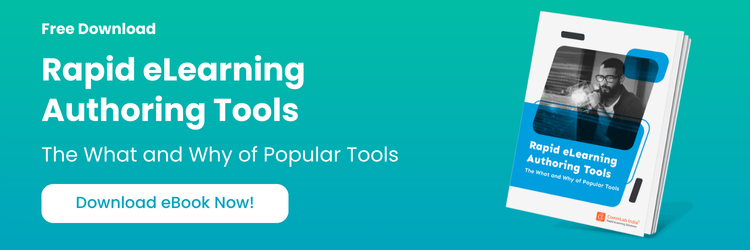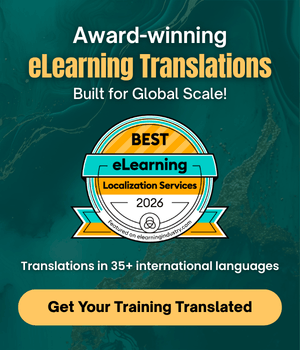For years, course authoring has followed a familiar formula, select a template, add some content, adjust for devices, publish, repeat. It worked well enough. But "well enough" doesn't hold up when learners expect more, and training is mission-critical to business success.
In a world where custom eLearning must be rapid, responsive, accessible, and deeply engaging, the tools we use can no longer afford to stay static.
Adobe Captivate 12.5 doesn’t just tweak the old model. It breaks it and rebuilds it for the way learning is designed, delivered, and experienced today.
This is the version that instructional designers and corporate L&D teams have been waiting for. Whether you’re rolling out global compliance training or creating product walkthroughs for sales teams on the move, captivate 12.5 offers the flexibility, power, and clarity to do it all-smarter and faster than ever before.
→ Download eBook Now: Rapid eLearning Authoring Tools
Table Of Content
- Adobe Captivate 2019: The Classic Version Explained
- What is Adobe Captivate 12.5?
- What’s New in Captivate 12.5 and What It Means for L&D Teams
- Captivate Classic vs Captivate 12.5
- Why Accordion Interactivity in Adobe Captivate 12.5 Is a Strategic Win for L&D
- What Are the System Requirements to Run Adobe Captivate 12.5 Smoothly?
Adobe Captivate 2019: The Classic Version Explained
Adobe Captivate 2019, also known as Captivate Classic, continues to be a trusted and powerful eLearning authoring tool for organizations that value flexibility, creativity, and results. It strikes the perfect balance between ease of use and advanced functionality, making it ideal for both beginners and experienced instructional designers.

What Makes Captivate 2019 Stand Out:
Immersive VR Learning
Craft 360° experiences for safety drills, virtual tours, and real-world simulations without coding.
Responsive Video Demos
Simultaneously capture screen, webcam, system audio, and on-screen actions for compelling software tutorials and walkthroughs.
PowerPoint to Interactive eLearning
Quickly convert existing slides into engaging, trackable courses with added quizzes, click-to-reveals, and branching.
Advanced Personalization
Design learning paths using variables, multi-state objects, and conditional logic for highly tailored experiences.

What is Adobe Captivate 12.5?
Adobe Captivate 12.5 is a next-generation eLearning authoring tool engineered to meet the demands of modern corporate training. It offers a reimagined interface, streamlined workflows, and built-in capabilities for designing scalable, responsive, and interactive learning experiences without custom coding.
Built on the Adobe Spectrum design system, captivate 12.5 introduces a modular architecture that allows L&D professionals to create content using responsive blocks, structured layouts, and pre-configured templates. It supports rapid authoring with drag-and-drop functionality, widget-based interactions, and intelligent content behaviors.
The tool is optimized for full-spectrum custom eLearning development
Curious how responsive eLearning actually looks in Captivate? Watch this quick demo to see it in practice.
What’s New in Captivate 12.5 and What It Means for L&D Teams
Why Captivate 12.5 supports today’s content and tomorrow’s goals
Here’s how Captivate 12.5 keeps teams ahead:
- Flexible enough for microlearning and blended learning
- Integrated features reduce the need for third-party tools
- Future-proof with SCORM, xAPI, HTML5 support
- Designed for easy onboarding and team collaboration
The 12.5 release of Adobe Captivate introduces a new generation of features that go beyond incremental improvements. These capabilities are tailored to help L&D teams accelerate authoring, enhance engagement, and deliver scalable, responsive, and accessible custom eLearning across the enterprise.

Here’s what’s truly new in this release-and how it impacts modern learning design:
AI Voice Studio
Convert scripts into expressive narration with built-in AI-powered text-to-speech. Choose from multiple languages and accents to scale voiceovers efficiently, making localization seamless and ideal for global training rollouts, especially since 90% of learners prefer training materials in their native language, boosting both engagement and comprehension.
Accordion Widget
New to Captivate, this widget allows you to organize dense content into collapsible sections, enabling smoother navigation and better knowledge retention especially for process-heavy or compliance topics.
Web Object Embedding
Insert live web pages, documents, or video platforms directly into your course. Learners can interact with dynamic, real-time content without leaving the learning interface.
Overlay Slides and Bookmarks
Enhance video-based learning with time-based overlays and bookmarks that guide learners through layered or annotated experiences, ideal for product walk-throughs and software demos.
Simplified Interactions Panel
A completely redesigned logic builder lets you create complex interactions with drag-and-drop simplicity. No programming requires just triggers, conditions, and actions that are visually connected.
Header and Footer Content Blocks
Create and reuse fully branded slide templates that include company logos, slide titles, navigation buttons, and consistent layout structure. An efficient way to maintain visual standards across courses.
CSV Question Import Template
Upload a single spreadsheet to generate full quizzes, including scoring logic and feedback paths. Perfect for bulk assessment creation in compliance or certification programs.
Deep Copy Functionality
Quickly replicate specific attributes like animations, object appearance, or logic from one component to another. Reduces duplication and ensures consistency across large projects.
Each of these features reflects a deep understanding of what L&D teams need most today: faster workflows, cleaner collaboration, better reusability, and more control over learner experience design.
Captivate Classic vs Captivate 12.5
|
Aspect |
Captivate Classic |
Captivate 12.5 |
|
User Interface |
Familiar but cluttered. Lots of panels, tabs, and timelines to manage. |
Clean, modern, and intuitive. Built for focus and ease of use, especially for newer team members. |
|
Responsive Design |
Manual. You set breakpoints and adjust layouts for every device. |
Fully responsive by default. Author once, and it adapts to all screen sizes automatically. |
|
Ease of Use |
Powerful but steep learning curve. Great for experts, but not always accessible to everyone. |
Designed for all skill levels. You can build fast, even if you're new to authoring. |
|
Interactivity |
Basic interactions available; advanced ones require custom logic or scripting. |
Rich, built-in widget gallery. No coding needed for branching, overlays, or dynamic experiences. |
|
Collaboration |
The review process requires stakeholders to install a separate app. |
Share a browser link for real-time, in-context feedback, no installations required. |
|
PowerPoint Import |
Supported. You can bring in slides as a starting point. |
Not available (yet). Focuses on native course creation using responsive layouts. |
|
Video-Based Learning |
Supports video demos and VR (360°) content. |
Doesn’t currently support VR, but enables overlays, bookmarks, and layered video storytelling. |
|
Quiz Building |
Manual slide-by-slide creation. |
Supports bulk question import via CSV for faster assessment development. |
|
Accessibility |
Strong support but requires setup. |
Built-in accessibility features aligned to WCAG 2.1 and Section 508 ready out-of-the-box. |
|
Visual Design Tools |
Mostly manual. Layouts and styling require more hands-on work. |
Offers layout blocks, image editing, Google Fonts, and text presets—all built in. |
|
LMS Integration |
SCORM and xAPI supported. |
SCORM and xAPI supported with no extra steps seamless LMS publishing. |
|
Learning Curve |
It can be time-consuming for new team members. |
Shorter ramp-up time, enabling faster onboarding and development cycles. |
|
Ideal For |
Experienced instructional designers who want full control and don’t mind complexity. |
Modern L&D teams who need to produce polished, scalable eLearning quickly and collaboratively. |
Tip for L&D Managers: If your team has been building content with workarounds, hacks, and heavy edits in Classic, you'll likely find Captivate 12.5 a refreshing shift one that helps you do more, in less time, with fewer barriers to collaboration.
Want a refresher on what made Captivate 9 a strong contender back then?
Watch this quick overview to see how the tool has evolved.
Why Accordion Interactivity in Adobe Captivate 12.5 Is a Strategic Win for L&D
Breaks Down Complex Content
This next gen authoring tool lets you convert dense SOPs, compliance policies, and technical material into collapsible, digestible sections that improve clarity and learner retention.
Drives Active Engagement
Empowers learners to explore content at their own pace, enhancing interaction, reflection, and better recall, especially in blended learning environments.
Supports Global Training
Create multilingual corporate training modules using 7 supported languages-English, French, German, Spanish, Korean, Japanese, and Brazilian Portuguese suitable for diverse, global teams.
Enables Scalable Customization
Segment content by role, function, or region within a single module.
Optimized for Mobile and Blended Learning
Responsive by default, making it ideal for anytime, anywhere training.
Accessibility Built-In
WCAG compliant with screen reader and keyboard navigation support.
Maintains Brand Consistency
Customize design and reuse accordion styles across courses.
Meets Modern Learner Expectations
Offers intuitive, interactive learning aligned with today’s digital habits.

What Are the System Requirements to Run Adobe Captivate 12.5 Smoothly?
System Requirements
To ensure optimal performance of Adobe Captivate 12.5 across your instructional design and training development teams, the following specifications are recommended:
For Windows Users:
- Processor: Multicore Intel® or AMD (2 GHz or faster) with 64-bit support
- OS: Windows 11 (22H2), Windows 10 (22H2), or later (64-bit only)
- RAM: 16 GB (32 GB or more recommended)
- Storage: 10 GB of free disk space (plus additional space during installation)
- Display: 1920 x 1080 or higher at 100% UI scaling
- Other: Broadband internet connection required for activation and updates
For macOS Users:
- Processor: Multicore Intel® or Apple Silicon (M-series)
- OS: macOS Sequoia (15), Sonoma (14), Ventura (13.4)
- RAM: 16 GB (32 GB or more recommended)
- Storage: 10 GB of free disk space (cannot install on case-sensitive file systems or removable drives)
- Display: 1920 x 1080 or higher at 100% UI scaling
- Other: Activation requires internet connection; phone activation not available
Browser & Mobile Compatibility (HTML5 Output)
To ensure that published courses run seamlessly:
- Windows Browsers: Edge 113+, Chrome 113+, Firefox 113+
- macOS Browsers: Safari 16.4+, Chrome 113+, Firefox 113+
- Mobile OS:
- iOS 16.4+ (Safari 16.4)
- Android 13+ (Chrome 113+)
Language Versions Available
Adobe Captivate 12.5 supports authoring in the following 7 global languages, enabling localization and global rollout of custom eLearning content:
- English
- French (Français)
- German (Deutsch)
- Spanish (Español)
- Korean (한국어)
- Japanese (日本語)
- Portuguese (Brazil) – (Português - Brasil)
These specifications suit most setups, though performance can vary with team size, course complexity, and license type. Factoring in the Adobe Captivate pricing model is key when planning for long-term or large-scale use.
Bringing It All Together
Adobe Captivate 12.5 marks a turning point in the evolution of eLearning authoring. With its modern interface, responsive design, and features built for scale, accessibility, and engagement, it empowers L&D teams to meet the growing demands of global, fast-paced corporate training.
Of course, every team is different. Choosing the right authoring tool depends on organizational goals, established workflows, and the type of learning experiences being developed along with practical factors like ease of use, team dynamics, and the overall Adobe Captivate price.
If you're weighing your options, this resource can help you make the right call.






